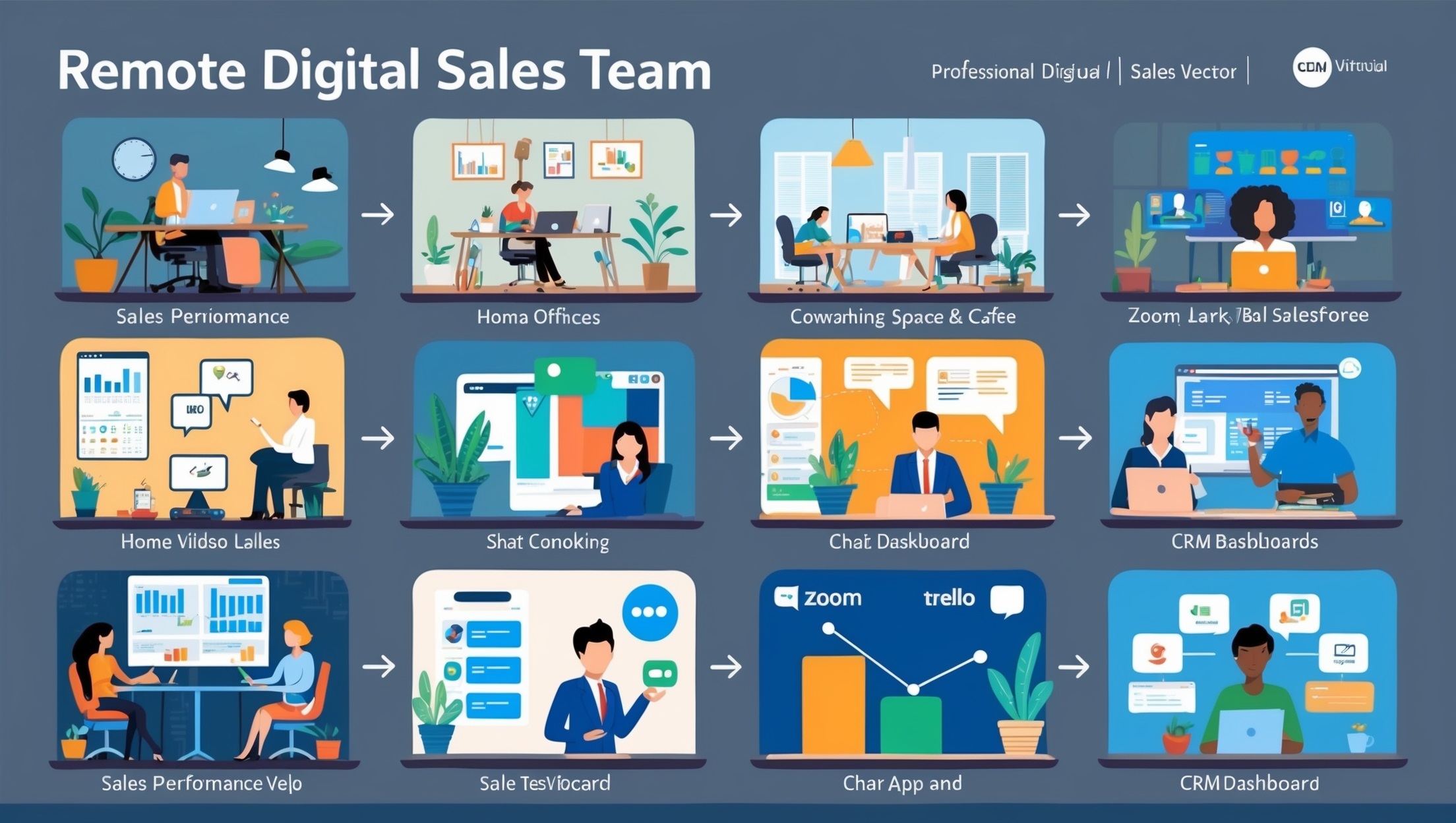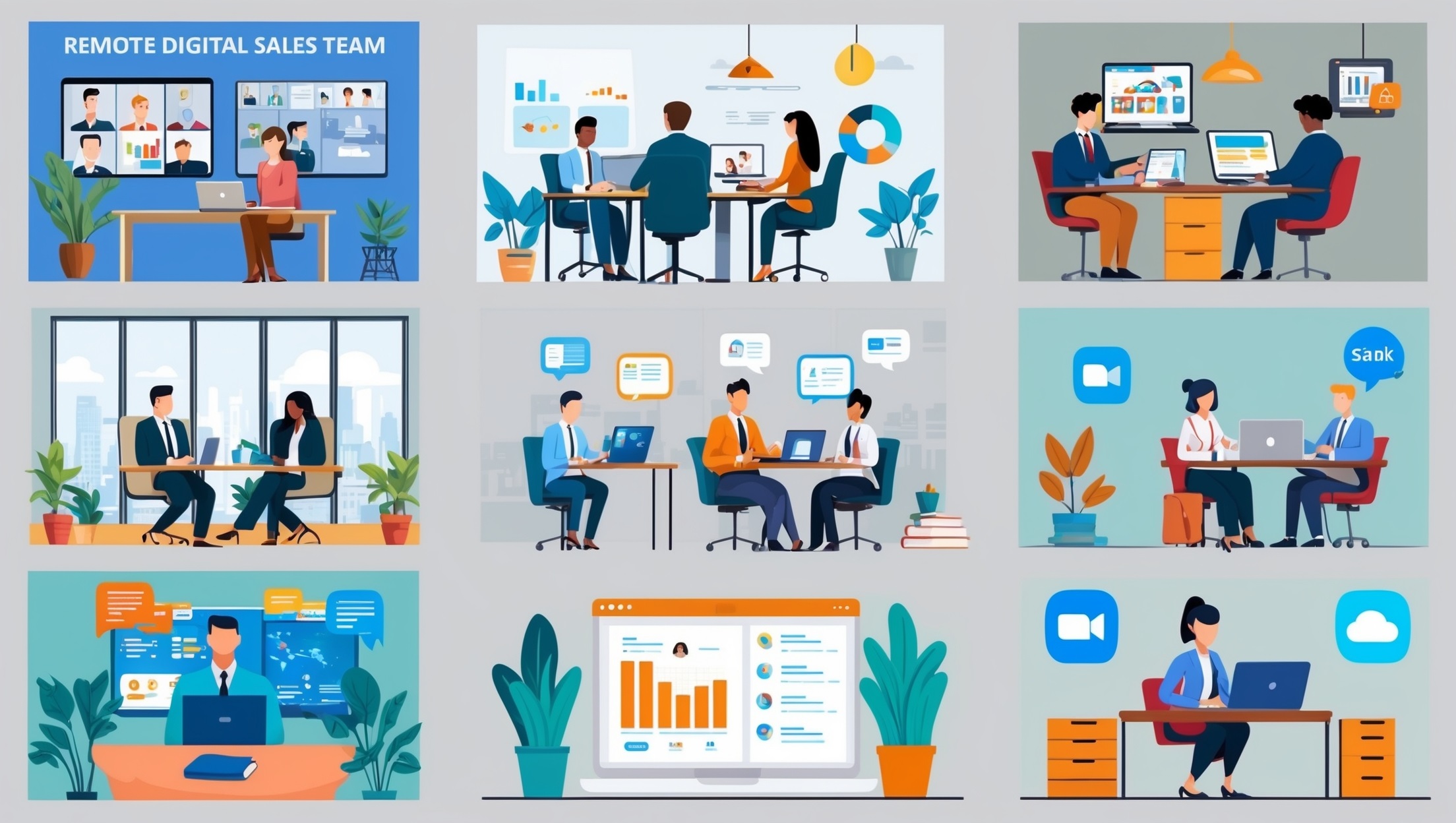
Scaling Your Digital Sales Team Remotely: Managing and Motivating Distributed Sales Reps
Table of Contents
Modern commerce isn’t limited to an in-office environment—remote or hybrid work has become the new normal for many sales teams across Northern Ireland, Ireland, and the rest of the UK. As businesses expand digitally, they can recruit sales talent in different locations and time zones, but face the challenge of maintaining motivation, team synergy, and consistent processes. This guide details how organisations can effectively scale and manage digital sales teams remotely, employing the right digital tools, AI-based lead generation, structured training, and a results-driven culture.
The Rise of Remote and Hybrid Sales
Post-pandemic transformations have revealed the effectiveness of remote collaboration in sales environments. A 2024 sales transformation survey indicated 57% of UK-based SMEs plan to keep at least half of their sales force remote. Key drivers include:
- Expanded Talent Pool: Companies can recruit top sales representatives from anywhere—Belfast, London, Cardiff, or beyond—eliminating geographical constraints.
- Cost Efficiency: Reduced overhead from office space, utilities, and daily commuting expenses translates to higher profitability.
- Productivity Gains: Many sales professionals report better focus, flexible scheduling, and improved work-life balance in remote environments.
- Scalability: Businesses can quickly expand into new regions without needing a physical presence, allowing for more agile market penetration.
- Data-Driven Sales: AI-powered CRM tools and virtual engagement platforms make tracking performance, managing pipelines, and personalising outreach more efficient.
However, businesses must tackle challenges like communication gaps, fostering team camaraderie, and maintaining consistent brand messaging when teams are working behind screens. Implementing structured onboarding, strong leadership, and the right technology stack can bridge these gaps and optimise remote sales success.
Recruiting and Onboarding Remote Sales Talent
Hiring and integrating remote sales talent requires a strategic approach to ensure alignment with company goals and culture. From sourcing candidates with strong self-motivation to providing structured onboarding and clear performance expectations, businesses must create a seamless experience that fosters productivity and engagement from day one.
Defining Role Requirements
To build an effective remote sales team, businesses must clearly define role expectations and qualifications. Key considerations include:
- Territory Coverage & Time Zones: If targeting cross-border markets, specify whether candidates must be based in certain regions or have flexible working hours to accommodate international clients.
- Language & Cultural Fit: For global outreach, highlight required language skills and familiarity with regional business customs to ensure smooth client interactions.
- Technology & Equipment Needs: Outline any required hardware (e.g., laptops, headsets) and software (CRM platforms, video conferencing tools) so candidates know what to expect.
- Availability & Travel Commitments: If occasional in-person meetings, trade shows, or client visits are necessary, make these obligations clear upfront.
- Performance Metrics & Expectations: Define KPIs like lead conversion rates, call volumes, or revenue targets, ensuring candidates understand success benchmarks before joining.
Transparent job postings with these details help attract the right talent, set clear expectations, and reduce turnover by ensuring candidates are fully aligned with the role’s demands from the start.
Structured Onboarding
- Develop a comprehensive digital onboarding blueprint covering product knowledge, competitor landscapes, and brand voice guidelines
- Utilise knowledge management tools like Notion or Confluence to store training guides, playbooks, and sales scripts
- Implement a short-term “buddy system” pairing new representatives with experienced colleagues for personalised guidance
Stat: A 2023 remote workforce study found companies with formal digital onboarding processes saw 20% higher new-hire satisfaction and significantly faster ramp-up times than those lacking structured documentation.
Leveraging AI-Based Lead Generation

AI-powered lead generation helps businesses identify high-potential prospects with greater accuracy and efficiency. By analysing data patterns, automating outreach, and predicting customer intent, AI tools streamline the sales pipeline, allowing teams to focus on the most promising leads and close deals faster.
AI can supercharge remote sales efforts through multiple avenues:
Predictive Lead Scoring
AI-driven lead scoring helps remote sales teams prioritise the most promising prospects, improving efficiency and conversion rates. By feeding CRM data—such as past website visits, email engagement, and previous interactions—into AI models, businesses can:
- Rank Prospects by Intent: AI assigns scores based on behavioural signals, identifying leads most likely to convert.
- Improve Time Management: Remote sales reps can focus on high-value leads instead of chasing cold prospects.
- Enhance Personalisation: Insights from predictive scoring allow tailored outreach, increasing engagement rates.
- Refine Strategies Over Time: Machine learning continuously improves scoring accuracy, adapting to shifting customer behaviours.
By leveraging AI-powered lead scoring, businesses ensure their sales teams work smarter, spending time where it matters most.
Smart Prospecting
- Employ AI tools that scan social platforms, industry events, or competitor customer bases to flag potential leads
- Partially automate email outreach with AI suggesting personalised lines referencing a prospect’s industry or location (such as “We noticed your participation in Derry’s local chamber event…”)
Chatbot Integration
- Route website visitors from initial chatbot enquiries to appropriate remote sales representatives for deeper conversations
- Bridge customer queries 24/7, ensuring no opportunity goes unaddressed regardless of time zone differences
Example: A mid-sized software provider in Northern Ireland integrated an AI lead scoring tool and noticed a 30% increase in closed deals within three months as remote representatives dedicated more time to prospects with higher conversion likelihood.
Tools for Communication and Collaboration
Effective communication and collaboration tools are essential for keeping remote and in-house teams aligned. From video conferencing and instant messaging to project management platforms, these tools streamline workflows, enhance productivity, and ensure seamless information sharing across departments.
Video Conferencing
Regular check-ins and structured communication are essential for keeping remote sales teams aligned. Utilise platforms like Zoom, Microsoft Teams, or Google Meet for weekly stand-ups, performance updates, and strategy discussions to maintain collaboration and accountability.
To ensure seamless communication:
- Stable Internet & Quality Equipment: Provide or recommend reliable internet connections and noise-cancelling headsets for clear audio.
- Consistent Meeting Schedules: Establish predictable meeting times across time zones to accommodate all team members.
- Engagement Best Practices: Use screen sharing, chat functions, and Q&A segments to keep discussions interactive and productive.
Strong virtual meeting habits foster team cohesion, ensuring remote sales reps stay connected and informed.
Project/Task Management
Effective teamwork in remote sales requires clear communication channels and structured workflows. Implementing dedicated Slack channels, Trello boards, or Asana workspaces helps teams stay organised and aligned.
Best practices include:
- Task & Lead Tracking: Use Trello or Monday.com to monitor daily tasks, lead progress, and follow-ups.
- Knowledge Sharing: Slack channels for industry news, sales strategies, and customer success stories foster continuous learning.
- Workflow Transparency: Make deal progress, sales targets, and key updates visible to ensure accountability and motivation.
By integrating these tools, remote sales teams can collaborate efficiently, maintain momentum, and drive results.
CRMs with Real-Time Synchronisation
- Adopt cloud-based CRMs like HubSpot, Pipedrive, or Salesforce allowing each representative to log customer interactions in real-time
- Enable seamless handoffs when team members are offline or on holiday
Pro Tip: Schedule monthly “virtual coffee breaks” or casual Slack sessions for representatives to connect beyond sales tasks—fostering authentic team bonding despite physical distance.
Training and Motivation in a Distributed Environment

Keeping remote sales teams engaged and motivated requires a mix of structured training, regular check-ins, and incentives. Virtual workshops, role-playing exercises, and AI-driven coaching tools help employees sharpen their skills, while recognition programmes and performance-based rewards keep them motivated and connected to company goals.
Regular Virtual Workshops
- Schedule focused sessions on advanced sales tactics, objection handling techniques, or product updates
- Utilise interactive tools like screen sharing, polls, and breakout rooms to keep training sessions engaging
Gamification Elements
- Create friendly leaderboards recognising achievements like “highest weekly close rate” or “most innovative customer approach”
- Incorporate small incentives (gift cards, public recognition) to foster healthy competition and engagement
Mentorship and Individual Check-Ins
- Ensure sales managers conduct monthly one-to-one calls with each team member
- Discuss individual challenges, personal development goals, and specific skill improvement opportunities
Stat: A 2024 remote sales training report indicated companies that hold monthly training and check-in sessions experience 35% better retention among remote sales representatives.
Aligning Culture and Brand Messaging
Ensuring remote sales teams align with your company’s culture and brand messaging requires clear guidelines, consistent training, and open communication. Regular brand immersion sessions, storytelling exercises, and real-time feedback loops help maintain a unified voice across all customer interactions, reinforcing trust and credibility.
Consistency in Sales Communications
- Provide regularly updated brand messaging, product details, and promotional offers in centralised shared resources
- Ensure representatives receive real-time updates on marketing campaigns and positioning changes
Reinforcing Brand Values
- Regularly remind representatives of company mission and local community connections—such as “We’re a Belfast-founded brand proud to support Northern Ireland’s SMEs
- Foster authenticity and a cohesive brand persona regardless of where representatives are physically located
Case Study: A Dublin-based marketing agency with representatives across multiple counties established a monthly “brand pulse” video call to review voice guidelines, share new success stories, and update unique selling propositions. They found representatives in outlying areas felt more connected to the core brand, significantly improving consistency in sales presentations.
Expert Quote from Ciaran Connolly, Director of ProfileTree

“Scaling a remote sales operation isn’t just about increasing headcount. The real challenge is ensuring each representative feels part of a unified mission while providing them with digital tools and AI solutions for streamlined workflows. That strategic synergy drives meaningful results—regardless of whether your team members are based in Belfast, Cork, or Manchester.” — Ciaran Connolly, Director, ProfileTree
Statistics and Implementation Framework
- 57% of UK-based SMEs plan to maintain at least half their sales force in remote positions (Sales Transformation Survey, 2024)
- Companies with formal digital onboarding processes experience 20% faster productivity ramp-up (Remote Workforce Study, 2023)
- Businesses conducting monthly check-ins maintain 35% better retention rates for remote sales staff (Remote Sales Training Report, 2024)
Scaling Remote Sales Framework:
- Strategic Planning: Identify territory/region coverage needs, essential technology infrastructure (CRM, conferencing platforms), and AI-powered lead generation opportunities
- Talent Acquisition: Implement systematic onboarding with comprehensive digital resources and experienced mentorship programmes
- Team Coordination: Establish weekly stand-ups, dedicated communication channels, and monthly skill development workshops
- Performance Management: Deploy transparent leaderboards, regular one-to-one feedback sessions, and consistent brand alignment updates
- Continuous Improvement: Gather representative feedback on processes, regularly refine sales scripts, and optimise technology configurations
Empowering Distributed Digital Sales Teams
The future of digital sales thrives on geographical flexibility—representatives in Northern Ireland can effectively manage leads from London, while colleagues in Edinburgh support prospects from the Republic of Ireland. By harnessing AI for lead prioritisation, ensuring robust digital communication channels, and sustaining a cohesive brand culture, organisations can scale remote teams with remarkable effectiveness.
In this evolving landscape, businesses that adapt swiftly gain significant competitive advantages. ProfileTree specialises in guiding remote sales transformations—from selecting appropriate CRM systems and AI lead generation tools to building motivational, brand-consistent cultures. Ultimately, a well-managed, properly trained, and strategically motivated distributed sales team can drive unprecedented growth across the UK, Ireland, and beyond.




